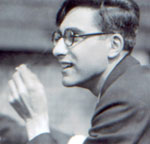
Zukofsky feature: Return to the Contents list
Benjamin Friedlander
FOR ZUKOFSKY/100
SPEECH
ACT for Michael
Davidson A spelling
Dictionary balled into
A fist resists
Translation, but incompletely.
The word become
Object of human
Exchange; its silence
Is a golden
Mean. Let sense
Beyond grasp be
Music to other
Ears. Our poems
Command more: lower
Limit gesture, upper
Limit caress. For
We who hear
Our syllables disintegrate
Under stress still
Hold the power
To communicate with
Reasonable success.
For the past four years I have been writing a long poem in homage to Zukofsky, of which “Speech Act” is an excerpt. The poem begins with an epigraph from “A”: “Intellect / resigned to / less is / susceptible at / least to / the range / of two / sides of / a coin.” The law of probability provides Zukofsky with his model in this credo, but what interests me is not the appeal to chance. “A”‘s two-sided susceptibility is a coin of poetry; it falls in a world where decisions produce possibilities that require decisions that produce possibilities. Resigned to less at the start, overwhelmed by intricacies at the end. This has certainly been my experience of writing a long poem.
My debts to Zukofsky derive, in particular, from two of his compositional strategies: homophonic translation and word counting. From the former I grasped that two distinct works of art might share a contiguous seam. For example, two poems with identical sound might communicate entirely different meanings. Not that Zukofsky’s transliterations are identical to their Latin originals—his Catullus is a wilier work of art than that—but insofar as “Salax taverna vosque contubernales” and “Salt hacks, tavern boys, what skews, can’t you burn alleys” aspire to a formal unity, their disunity of meanings becomes more astonishing. Astonishing, I should say, for anyone who believes, as I was taught to believe, that form and meaning are intrinsically related. What Zukofsky calls translation is more precisely a practice of transformation; it promotes difference, not equivalence—but difference within a single horizon. Like the two sides of a coin, the aesthetic decisions of one writer provide a material support for those of another.
In my long poem, which I call One Hundred Etudes, I develop Zukofsky’s practice in a slightly different direction. Three of my etudes superimpose two texts published at about the same time: Sonnets from the Portuguese and The Eighteenth Brumaire of Louis Napoleon. The rhyme and meter come from Browning, the language from Marx. Going further, I’ve refracted Browning’s Petrarchan sonnets through the imposition of another Zukofskyan device: word counting. All hundred of my etudes are broken into three-word lines and three-line stanzas, with etude number, dedication, and title absorbed into the numerical pattern. In Zukofsky’s work, such patterning produces its own prosody and syntax. What appeals to me is the refraction, which recasts the poem in a new form without abandoning the old one. And why not? If a single form can produce two meanings, why not allow a single meaning to support two forms?
In oral performance, of course, one must make a choice between the two alternatives. But since decision is the soul of Zukofsky’s poetics, and since Zukofsky’s own translations of Marx are decidedly Modernist in idiom, decision here is welcome and easy:
SONNET
FROM THE BOURGEOISIE
There the form
Supercedes the content,
Here the content
Supercedes the form:
The piled illusions
Of democrats, reconciled
In struggle—displaced
By cudgels of
Fear. A woman
Cries “Gendarme! Gendarme!”
In clear accents
Faithfully copied from
A child. Hostile
Troglodytes, undefiled, reach
Out to smash
Her face, which
Held me dear.
With feverish eyes,
A toppled statue
Heaves the word
That stones couldn’t
Animate. Discharged soldiers
Prick a bubble:
Truth. Socialist castles
In the air
Fall straightway to
The ground. North
Sweeps away the
South, its class
Position to annihilate.
________________________________
I was going to end here, but I realized this morning, in light of the conference, that choosing a Modernist idiom over a Victorian one has the unfortunate effect of using Zukofsky to silence Browning—a familiar historical gesture and one that is, perhaps, as encoded in Zukofsky’s legacy as the fives in “A”-22/23. I want, then, to rescind my “easy” decision by equivocating, literally, and giving voice to Elizabeth Barrett Browning’s Marx as well:
SONNET FROM THE BOURGEOISIE
There the form supersedes the content, here
The content supersedes the form: the piled
Illusions of democrats, reconciled
In struggle—displaced by cudgels of fear.
A woman cries “Gendarme! Gendarme!” in clear
Accents faithfully copied from a child.
Hostile troglodytes, undefiled,
Reach out to smash her face, which held me dear.
With feverish eyes, a toppled statue
Heaves the word that stones couldn’t animate.
Discharged soldiers prick a bubble: truth.
Socialist castles in the air fall straight-
Way to the ground. North sweeps away the south,
Its class position to annihilate.
cf: Elizabeth Barret Browning, XXIII.
it is made available here without charge for personal use only, and it may not be
stored, displayed, published, reproduced, or used for any other purpose
This material is copyright © Benjamin Friedlander and Jacket magazine 2006
The Internet address of this page is
http://jacketmagazine.com/30/z-friedlander.html
